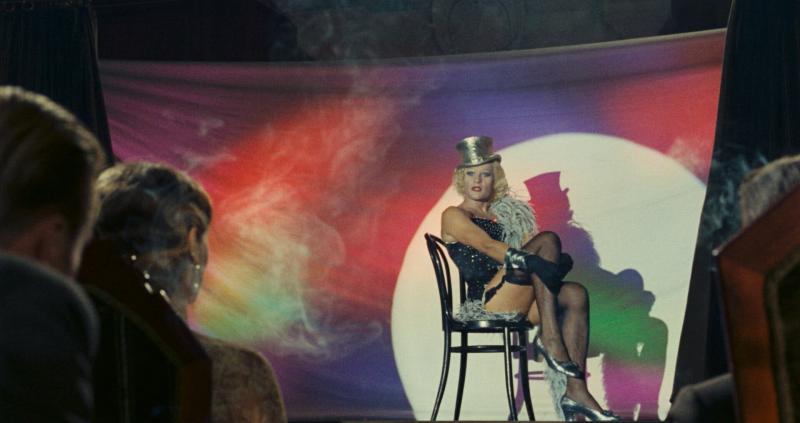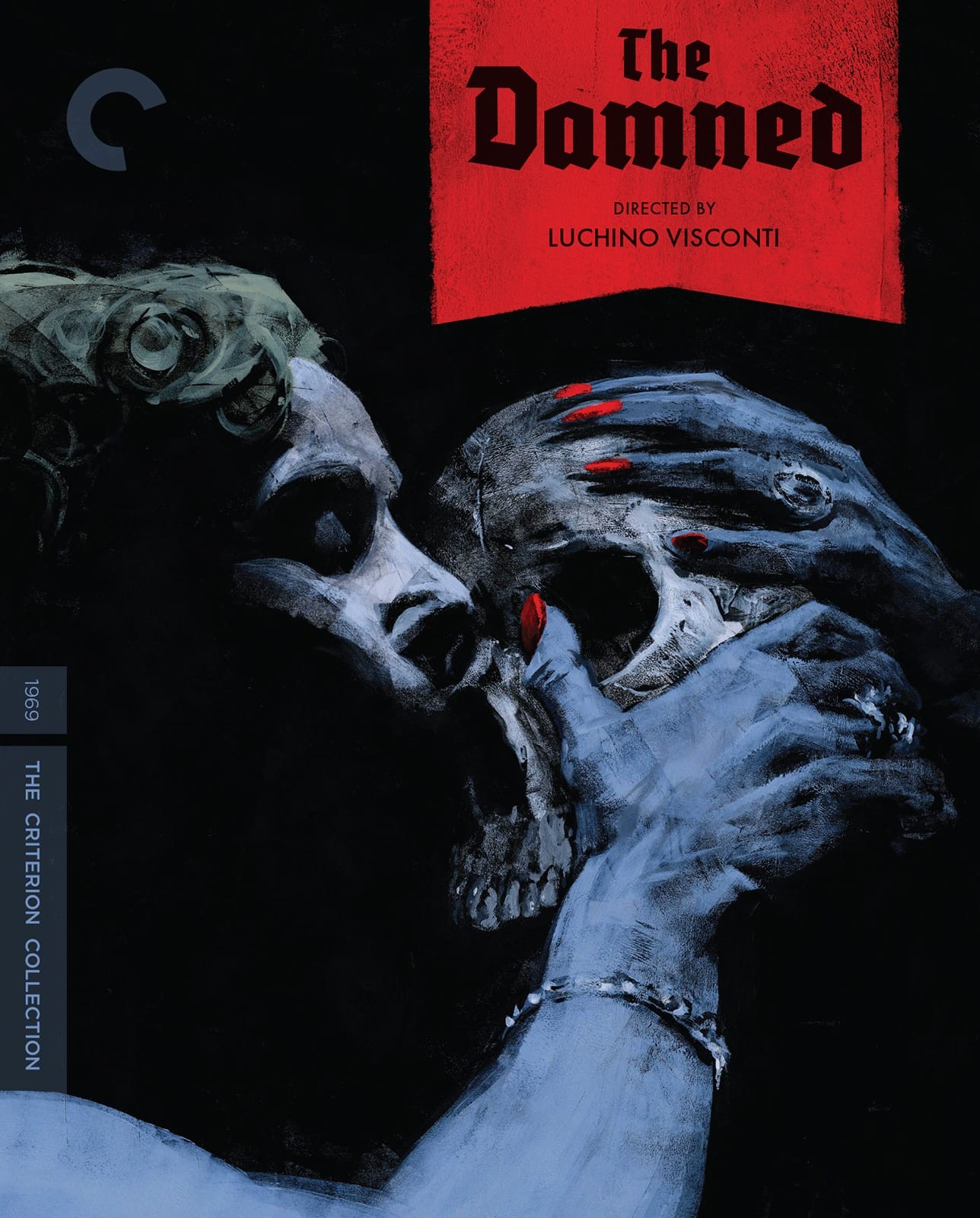Blu-ray: The Damned | reviews, news & interviews
Blu-ray: The Damned
Blu-ray: The Damned
Luchino Visconti’s indispensable trend-setting drama

One German writer found a neat yet teasing way to sum up the difference between Luchino Visconti’s The Damned (1969), the first film in the Italian director’s “German trilogy”, and the two films that followed it.
The Damned, known in Italian as La caduta degli dei (meaning "the twilight of the Gods"), the writer explained, is “a masterpiece which is nonetheless suitable for the cinema-goers who fell asleep during Death in Venice (1971) or Ludwig II (1973)."
Visconti did, indeed, set out deliberately to surprise and to shock with The Damned, as he explains in a 1970 interview that's among the extras on this new Criterion release, a 2K digital restoration by the Cineteca di Bologna and Institut Lumière. In particular, he intended the dawn mass-killing of Ernst Röhm’s brownshirts, the so-called Night of the Long Knives of 30 June–2 July, 1934, to be sgomento, "alarming". Visconti’s imperative to give a warning about the dangers of fascism ran deep. When asked why the carpets in one of the grand houses used in the film needed be replaced with parquet flooring for the film, an operation which was to take several days, he declared that it was necessary because “the floor must play the music of fear”.
 Yet Visconti also flirts with Nazi depravity and “chic” in a way that would be impossible today. And that fascination and those tropes make The Damned a film alive with contradictions, bringing to the fore Visconti’s own ambiguities as a gay Catholic and as a patrician communist. Such internal dichotomies have produced a vast array of scholarly explorations. For those seeking a launch-pad to go off and explore things like “neo-Gramscian hegemony”, there may be no other film quite as provocative or as fertile for theorising as this one.
Yet Visconti also flirts with Nazi depravity and “chic” in a way that would be impossible today. And that fascination and those tropes make The Damned a film alive with contradictions, bringing to the fore Visconti’s own ambiguities as a gay Catholic and as a patrician communist. Such internal dichotomies have produced a vast array of scholarly explorations. For those seeking a launch-pad to go off and explore things like “neo-Gramscian hegemony”, there may be no other film quite as provocative or as fertile for theorising as this one.
Visconti elides and overlays both factual and fictional backgrounds in it, and that, too, has also proved fertile ground for exegesis. The Essenbeck family clearly has a historical antecedent in the Krupps. Visconti was fascinated with the fact that “cannons have always served the German state”, and that the Krupps had been making them since 1587. He was equally fascinated by the Krupp heir who walked away from his inheritance, Arndt von Bohlen und Halbach, who is clearly a model for the doomed character Martin, the breakthrough role for Helmut Berger. And yet the story of the downfall of an aristocratic family also has literary antecedents, not just in Thomas Mann’s Buddenbrooks, but also further back. When Visconti describes the smilingly evil character of Aschenbach, played by Helmut Griem, he sees him as representing the same function as the witches in Macbeth.
The Damned can be stagey and operatic, often creepily and ponderously so, but it is fascinating for its long-term function as a trend-setting and highly influential work. It was so widely watched that it became unavoidable, and paved the way for movies that followed it, for Dirk Bogarde and Charlotte Rampling to reunite in the dark Nazi-inspired games of The Night Porter. Further along the line it is hard to imagine Fassbinder’s Despair, also with Bogarde, without the blueprint of The Damned.
The future of Arts Journalism
You can stop theartsdesk.com closing!
We urgently need financing to survive. Our fundraising drive has thus far raised £49,000 but we need to reach £100,000 or we will be forced to close. Please contribute here: https://gofund.me/c3f6033d
And if you can forward this information to anyone who might assist, we’d be grateful.

Subscribe to theartsdesk.com
Thank you for continuing to read our work on theartsdesk.com. For unlimited access to every article in its entirety, including our archive of more than 15,000 pieces, we're asking for £5 per month or £40 per year. We feel it's a very good deal, and hope you do too.
To take a subscription now simply click here.
And if you're looking for that extra gift for a friend or family member, why not treat them to a theartsdesk.com gift subscription?
more Film
 Tornado review - samurai swordswoman takes Scotland by storm
East meets West meets North of the Border in a wintry 18th-century actioner
Tornado review - samurai swordswoman takes Scotland by storm
East meets West meets North of the Border in a wintry 18th-century actioner
 Lollipop review - a family torn apart
Posy Sterling brilliantly conveys the torment of a homeless single mother denied her kids
Lollipop review - a family torn apart
Posy Sterling brilliantly conveys the torment of a homeless single mother denied her kids
 Big Star: The Nick Skelton Story review - the ways of a man with his mount
Documentary about the champion showjumping duo
Big Star: The Nick Skelton Story review - the ways of a man with his mount
Documentary about the champion showjumping duo
 Ballerina review - hollow point
Ana de Armas joins the Wick-verse to frenetic but soulless effect
Ballerina review - hollow point
Ana de Armas joins the Wick-verse to frenetic but soulless effect
 Blu-ray: Eclipse
The BFI has unearthed an unsettling 1977 thriller starring Tom Conti and Gay Hamilton
Blu-ray: Eclipse
The BFI has unearthed an unsettling 1977 thriller starring Tom Conti and Gay Hamilton
 The Ballad of Wallis Island review - the healing power of the old songs
Estranged folk duo reunites in a classy British comedy drama
The Ballad of Wallis Island review - the healing power of the old songs
Estranged folk duo reunites in a classy British comedy drama
 The Salt Path review - the transformative power of nature
Marianne Elliott brings Raynor Winn's memoir to the big screen
The Salt Path review - the transformative power of nature
Marianne Elliott brings Raynor Winn's memoir to the big screen
 Bogancloch review - every frame a work of art
Living off grid might be the meaning of happiness
Bogancloch review - every frame a work of art
Living off grid might be the meaning of happiness
 When the Light Breaks review - only lovers left alive
Tender close-up on young love, grief and growing-up in Iceland
When the Light Breaks review - only lovers left alive
Tender close-up on young love, grief and growing-up in Iceland
 Blu-ray: Strange New Worlds - Science Fiction at DEFA
Eye-popping Cold War sci-fi epics from East Germany, superbly remastered and annotated
Blu-ray: Strange New Worlds - Science Fiction at DEFA
Eye-popping Cold War sci-fi epics from East Germany, superbly remastered and annotated

Add comment